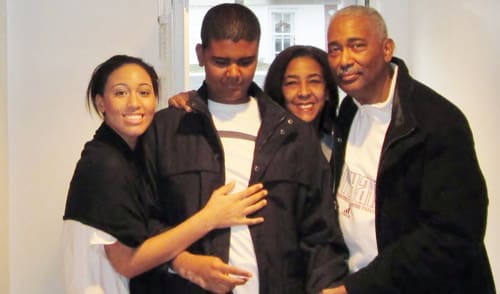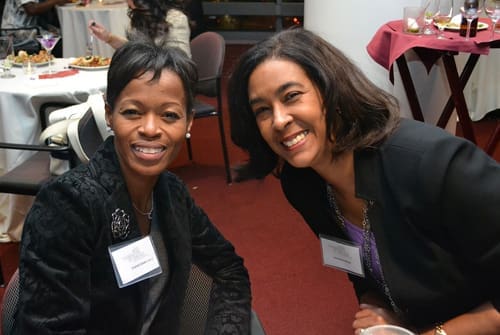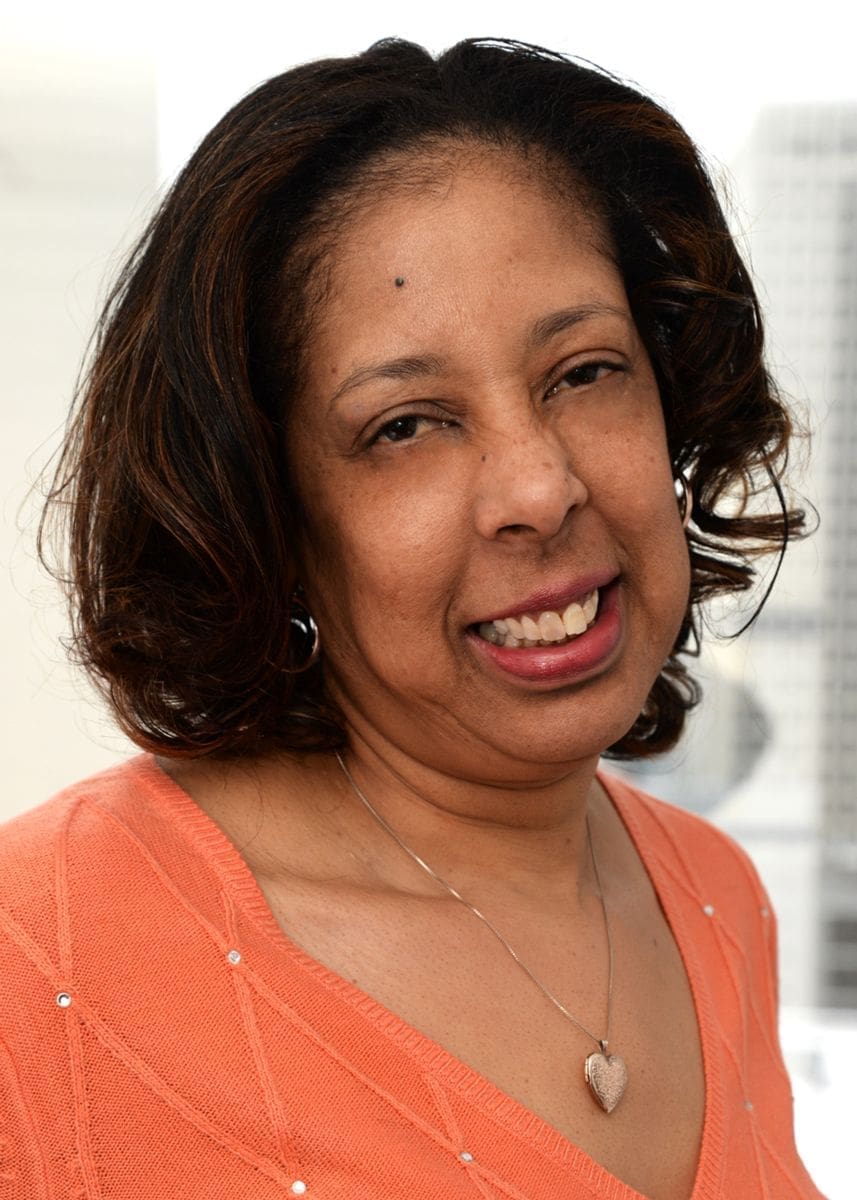 |
| Dr. Lisa Henry-Reid poses with her family. From left to right, daughter Lorelle, son Taylor, Dr. Henry-Reid and her husband Samuel. |
Dr. Lisa Henry-Reid remembers when AIDS became personal for her.
It was 1996. One of her first AIDS patients, a young man she had grown close to, was dying of AIDS. Refusing medication, he wasted away until he was too weak to leave his West Side house or even answer the door. So, Henry-Reid would go to him, sometimes bringing along her 3-year-old daughter. They watched movies and shared meals.
When she left for Hawaii to celebrate her husband’s 50th birthday, she was racked with worry that the young man would die in her absence and called him daily. He died a month or so after she returned to Chicago. He was 20 years old.
“I think I cried more than anyone at his funeral,” said Henry-Reid in a recent interview. “It was very painful but it toughened me up a bit.”
By then, the Detroit native had already established herself as one of the leading physicians in the field of adolescent medicine. Today, she’s known as one of the experts in the country on young people who are infected with or affected by HIV/AIDS. At the AIDS Foundation of Chicago’s March 27 fundraiser dinner, she will accept the inaugural Civic Leadership Award.
She’s planning on bringing some of the people she credits for her success: her patients. (Not all are HIV-positive.)
“It’s not even really my success,” said Henry-Reid, just recently elected to the board of directors for the AIDS Foundation of Chicago (AFC). “We’ve had some great patients, many of whom have taken good care of themselves.That makes you feel wonderful. It’s because of them that you feel successful.”
Twenty years since she helped open Cook County’s first HIV clinic for young adults, Henry-Reid continues to treat patients at John H. Stroger, Jr. Hospital of Cook County, where she currently serves as chair of the Division of Adolescent Medicine and Young Adult Medicine.
She is also the co-principal investigator of the Adolescent Trials Network for HIV/AIDS Interventions, a national consortium of youth-focused HIV clinical care sites. Her longtime colleague, Dr. Jaime Martinez is the principal investigator on that federally-funded research project.
To think, she could have been a dancer instead. Born and raised in Detroit, Lisa was the daughter of a policeman and a teacher. She had a younger brother named Kevin. She attended Cass Technical High School in the chemistry/biology curriculum because she loved science.
Born with her right foot slightly turned in, Lisa was encouraged to take up dance at the age of 3 as a means of improving her balance and coordination. What started as therapy became a passion for the girl. Throughout her childhood, she studied ballet and tap and eventually joined a classical ballet conservatory in Detroit.
In high school, she was accepted for a summer internship at the Arthur Mitchell Dance Theatre of Harlem. But it was a dream deferred. She suffered a knee injury in her junior year and would never be the same dancer. So, she enrolled at Cornell University in 1972 as a pre-med student. Her parents were not displeased by this change of direction.
“As a black woman, I wanted to go into a field where I would always have an opportunity for employment,” Henry-Reid said. “I didn’t want to ever have to depend on someone else for my livelihood.”
 |
| Dr. Henry-Reid, at right, with Ciuinal J. Lewis, project director for Connect to Protect, at AFC’s 2011 Annual Meeting. |
She attended medical school at Howard University and decided to go into pediatrics. It was her second year residency at the Children’s Hospital of Michigan when Henry-Reid discovered an affinity for adolescents. She was struck by how unpopular and marginalized they were within the health care system.
“No one seemed to like them. It was like ‘all they’re going to do is lie to you,’” she recalled. “People were just sort of scared of them. But it was a population that I loved.”
She went on to become the first female chief resident at the Children’s Hospital of Michigan and completed a fellowship in adolescent medicine in 1986. Following her fellowship, Henry-Reid seized an opportunity in academic medicine and moved to Chicago. She was to develop a new adolescent medicine curriculum for the pediatric department at the University of Illinois Hospital.
In 1988, she moved over to the Cook County Hospital’s Division of Adolescent Medicine. (Cook County Hospital was later renamed Stroger Hospital.)
Around the same time, there was an influx of HIV patients from the pediatric hematology department and the general adolescent clinic. In 1992, she was asked to help run a new HIV/AIDS clinic for young adults with Dr. Martinez within the division of adolescent medicine. Back then, many of the HIV/AIDS patients were dying. Henry-Reid mulled the decision.
“I didn’t know if I had what it took emotionally and psychologically to have kids die on my watch,” she said.
Many physicians were asking themselves the same question, Martinez said. And though times have changed in that regard — with treatment, AIDS is no longer a death sentence — his opinion of Henry-Reid has not wavered.
“My first impression of her, and what has always been my impression, is that she’s very dedicated to caring for youth, particularly marginalized youth like young MSM (men who have sex with men),” Martinez said. “She’s dedicated a lot of her life to the youth. She has great vision.”
Henry-Reid now lives in the South Loop with her husband, Samuel L. Reid. They have two children, Lorelle and Taylor.
Regarding the ongoing fight against HIV/AIDS, she is not pollyanna.
She speaks bluntly about the challenges ahead: “We’ve got a problem and the problem is no longer gay white men who lobbied for all those years. We don’t have a strong voice in the African-American community. We don’t have an ACT Up. And we’re also in a terrible economic time. The White House has an agenda for HIV/AIDS but it’s just paper at this point. If we don’t put the resources there, I’m very pessimistic.”
The future of the epidemic will depend, in part, on how successful efforts are in communities of color, particularly with young gay/bi men, she said. There remains a lot of ignorance about HIV and homophobic stigma is still rampant.
Henry-Reid pointed to the American success story of reducing the number of mother-to-child transmissions to almost none over the last 20 years. In Illinois, there are only one or two babies a year born with HIV, she said. It’s time for government agencies, nonprofits and health care professionals to galvanize for adolescents in the same way.
“Everyone was all about protecting the babies. Now if a baby is born with HIV, it’s a rare phenomenon. It makes the front page news,” she said. “So my thing is, we’ve taken care of that population. What’s next?”
***
Tony Kushner will be the guest of honor at the AIDS Foundation of Chicago’s 2012 fundraising dinner, An Angel Among Us: A Evening with Pulitzer Prize-winning Playwright Tony Kushner, on March 27. Tickets can be purchased online or by calling Rhett Lindsay, AFC’s manager of fundraiser events, at (312) 334-0935.


